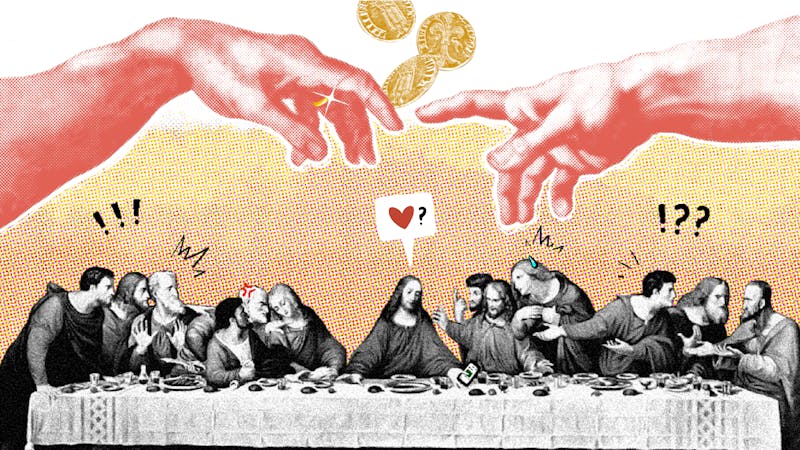Growing up, many of us were enthralled by the "Tide Pod Challenge." Even as kids, we were shocked that people were eating laundry detergent and risking their lives just to be a part of a trend. But these dangerous trends didn’t die with Musical.ly. High–ranking politicians are adamant about the fact that vaccines cause autism, and “Big Pharma” wants us to stay sick, creating fuel for perverse, unscientific health trends to gain traction.
“You cannot trust medical advice from medical professionals," said Robert F Kennedy Jr., the new head of the Department of Health and Human Services, who has a long history of spreading dangerous health misinformation. He has falsely claimed many extremist health conspiracies to be true, for example, the idea that fluoride is linked to arthritis, bone fractures, bone cancer, IQ loss, neurodevelopmental disorders, and thyroid disease. This has been disproven many times, yet he (along with many other conspiracy theorists gaining new prominence) is steadfast in their defense of this “truth."
During his confirmation hearing, RFK Jr. was grilled extensively on his radical medical views. He debated with Senator Tina Smith (D–Minn.), for example, over his views connecting antidepressants to school shootings. RFK has previously claimed that antidepressants are not only a factor behind the increase in school shootings (a belief discredited by several accredited studies), but also that they are harder to quit than heroin. Senator Smith concluded that his radical views reinforced harmful stigmas around mental illness and psychiatric medications.
We may laugh at the ridiculous claims RFK and the “MAHA” movement propagate, but we have good reason to be afraid. The health misinformation pandemic we are experiencing is a threat to the basic existence of our society. Measles, also called rubeola, is a deadly viral infection that small children are at risk for. It had been eradicated for many years through the use of vaccines—until Texas began experiencing an outbreak of measles in just the past few months. The reason? Anti–vaccine rhetoric.
In February, an unvaccinated child in Lubbock, Texas died of measles. Since then, Texas HHS officials have reported a 20% increase in measles cases across Texas, and the outbreak is quickly spreading to neighboring states. Almost all cases of the outbreak are children who have not been vaccinated against the disease. The CDC recommends the measles vaccine (the MMR vaccine) be given only to children older than 12 months old. Not vaccinating your child not only puts your own child at risk but also other children who are not yet able to be vaccinated. With anti–vaccine rhetoric gaining new legitimacy, I’m scared that my beloved young cousins, and possibly my future children, will be put in danger because of someone else’s choice.
Anti–vaxx rhetoric is by no means a new phenomenon. In 1998, Andrew Wakefield published a study linking MMR vaccine administration to autism spectrum disorder in children. Experts quickly found that his data was faked in order to mislead people into purchasing his competing MMR vaccine. This study was the catalyst that caused our current anti–vaccine crisis. Despite this idea being debunked time and time again, many anti–vaxxers are persistent in their belief that “they” only want you to “believe” it’s been debunked—and that “they” want our children to be developmentally delayed so as to be easily controlled.
All of this is not to say that existing health standards can't be subject to criticism. Ritz crackers, Skittles, and Coffee–Mate creamer are among many of the US products that have been linked to health risks by other countries like members of the European Union and Canada. There is no doubt that our food regulation system needs stricter standards in determining what is healthy for us, especially considering the fact that nearly 40% of United States adults are overweight, as reported by the CDC. However, many radical pseudo–health advocates have the wrong approach to fixing our health system.
A key example of this misplaced fervor for reform is in the viral push to consume “raw foods” to keep one’s diet natural (think Liver King). Now, consuming raw vegetables or opting for a raw vegan diet can allow you to get essential vitamins, minerals, and phytochemicals, all of which can help fight cancer or other diseases. Consuming raw milk or meat, on the other hand, can expose you to bacteria like E. coli and Listeria. Many TikTokers have started drinking raw milk in order to promote a “healthy gut” and get “essential nutrients removed during the pasteurization process”. Predictably, these viral claims about raw milk’s benefits have little scientific backing.
Watching influencers happily snacking on borax as a miracle cure for joint pain; people shoving garlic up their nose to relieve sinus pressure instead of seeking medical help; granola moms walking barefoot on the Philadelphia streets because “it’s better for their feet than wearing shoes”—it’s hard not to be terrified. Health misinformation affects people from all backgrounds, ranging from one–with–Mother–Earth Whole Foods enthusiasts to conspiracy theorists using Facebook as their health Bible. Misinformation is rampant in our society, and growing mistrust in the scientific establishment continues to fuel the growth of a booming echo chamber of pseudo–health science.
Ethical, evidence–based science takes time, time in which social media can spread a quick, but incorrect answer to any health question. Many people simply don’t have the tools to find the needle of truth in a haystack full of deceptions. As a nursing major, even I struggle to remind myself to question everything I see online when it comes to my health. It’s so easy to trust a 15–second video and move on instead of taking an extra 5 minutes to verify if what the influencer is saying is true. It’s difficult to decide what to trust, especially when the claims are being made by seemingly educated individuals.
Our health should be fiercely protected by taking extra steps to ensure we are promoting healthy behaviors for ourselves and others. Our health is in our hands, and we are the last line of defense in an increasingly volatile world of health and wellness trends.






